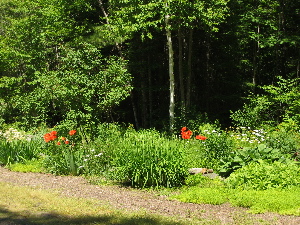JULYOrder spring bulbs now for the best selection
Fertilize plants growing in containers
Direct seed kale seed for fall harvest
Sow a fall crop of peas
Pinch basil plants to promote bushiness
Side dress vegetables with nitrogen
If your vegetables are not yielding as much as you'd like, plant some high nectar flowers in the vegetable garden to attract more bees and other pollinators.
Pict the zucchini while it's young and tender.
Put nets over blueberries to protect them from birds. While you're there, give them a little fertilizer as well.
Remove fruiting raspberry canes after you've harvested the berries.
Control the growth of strawberry runners. If you don't trim them back to where you want them, they will be all leaves and no berries!
Dead-head (prune off) all your spent blossoms
It's a good time to sow seed of biennials and perennials
Cut back delphiniums when they are finished flowering. A complete
fertilizer at this time may encourage a second blooming.
Chrysanthemums will give a better fall display if fertilized a
bit now. You can continue pinching them back until mid-July for more blooms.
Try planting a clump of moisture loving Japanese iris where it can catch the water dripping from your air conditioner!
Madonna lilies should be divided as soon as the flowering period
is over.
Oriental poppies may be moved. Summer is the only time of the
year they can be divided successfully. Dig up the roots and cut them into 2 inch pieces and replant them in their new location.
Dahlias require little artificial watering in a normal season,
but should be soaked once a week during drought
Water your roses at least once a week
Floribunda roses will flower all summer if the old flower clusters
are snipped off regularly
This is the time for transplanting iris. Trim back foliage and only replant healthy, firm rhizomes. Set them quite close to the surface!
In fact, this is the best time to divide spring blooming perennials.
Start cuttings of coleus, geraniums, begonias and other plants
you want inside for the winter.
The snow-in-summer should be pruned hard as it makes such rapid
growth at this time
When you trim deciduous hedges(ie,privot)be sure the sides slope out toward the bottom to be sure that sunlight reaches the base of the plants.
Wisteria's may be pruned now
Be sure that you dead-head all your daylilies. They will attempt do make seeds if you don't do this. You want them to build stronger roots. Daylilies will bloom more profusely next time if you remove spent blooms. Dead heading will also give you the possibility of a "re-bloom"!
This is a good time to attack Poison Ivy! Using discardable plastic gloves, cut the stems and paint the open wound with an herbicide on a HOT, SUNNY day!
Have you got Hosta's? Are there slugs chewing them? Try this solution, if you haven't already.
Combine 9 parts water to 1 part common household ammonia and spray it on the hosta just before dark. When the slugs hit this, they will dissolve!
When you weed, grab the flowering ones first so they don't go to seed and spread! Then go after the tallest ones that are just taking over your other plants. Pick on the little guys last.
Watch for
tomato hornworm and hand pick them.




